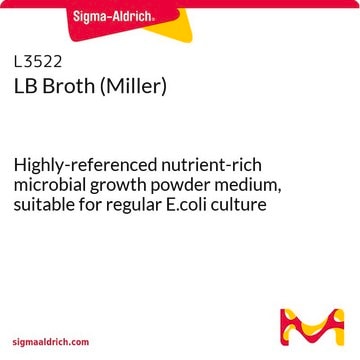L7275
LB Broth (Lennox)
Tablet microbial growth medium
Synonym(s):
Lennox broth , Luria Bertani Broth
About This Item
Recommended Products
grade
for molecular biology
sterility
non-sterile
form
tablet
technique(s)
microbiological culture: suitable
application(s)
food and beverages
microbiology
storage temp.
room temp
suitability
nonselective for Escherichia coli
nonselective for coliforms
General description
Application
Features and Benefits
- Convenient small package to eliminate weighing
- Fast preparation – no stirring required
Components
5 g/L Yeast Extract
5 g/L NaCl
2.2 g/L inert binding agents
Reconstitution
Legal Information
related product
Storage Class Code
11 - Combustible Solids
WGK
WGK 3
Flash Point(F)
Not applicable
Flash Point(C)
Not applicable
Certificates of Analysis (COA)
Search for Certificates of Analysis (COA) by entering the products Lot/Batch Number. Lot and Batch Numbers can be found on a product’s label following the words ‘Lot’ or ‘Batch’.
Already Own This Product?
Find documentation for the products that you have recently purchased in the Document Library.
Customers Also Viewed
Protocols
General protocols for growth of competent cells in microbial medium.
Our team of scientists has experience in all areas of research including Life Science, Material Science, Chemical Synthesis, Chromatography, Analytical and many others.
Contact Technical Service














